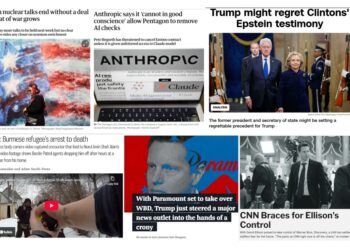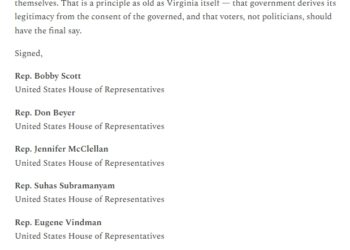The following blockquote contains excerpts from Rep. Gerry Connolly's statement on H.R. 32, expressing the sense of the U.S. House of Representatives with respect to the tragedy in Tucson, Arizona (bolding added by me for emphasis). I couldn't agree more.
Mister Speaker, I rise to join my colleagues and the rest of the Congressional community in extending my prayers and support to the victims of the horrible shooting this past Saturday in Tucson, Arizona, and to their families and friends...
This past Saturday was yet another tragic reminder of the prevalence of violence in our society. Our primary concern at this moment must be with the victims and their families and friends. We must help them work through their grief. We must help the injured through their recovery process.
There is no silver lining when six people are murdered. However, if we do not learn from this tragedy, then we will be doomed to repeat it. Mr. Speaker, I would submit that our political rhetoric has become grossly overheated, and it's time for all of us to take a step back and reflect on the effects of the vitriol.
The philosopher, Voltaire, once wrote, "I detest what you write, but I would give my life to make it possible for you to continue to write." He was articulating a crucial component - perhaps THE crucial component - on which our nation was founded: That no matter how much I may disagree with your opinion, it is essential that you have the right to express it.
But too often, lately, it seems that we cannot merely disagree with one another's opinions or policies. Instead disagreements become personal. Verbal attacks devolve into harsh questions about motives and character. Debates about policies or proposals sink to fear-mongering and rhetorical claims that the fate of our Republic lies in the balance.
Those of us in this chamber, and others in elected office, understand the rhetorical nature of such comments, but can we be absolutely certain that such verbal attacks are not being misconstrued in a culture of increasing anger and a greater acceptance of confrontation?
Absolutely, we must preserve each person's fundamental First Amendment rights, but can we not agree that we ought to disagree in a more agreeable fashion? As elected Representatives, our words certainly do have consequences for the policies and actions we are trying to shape, but it extends well beyond these four walls ... to the thousands of people who provide us with staff support here in the Capitol and in our home districts ... for the men and women who are the face of our government, performing essential federal work every day in communities across our nation and especially for the public, which has placed its trust in us.
There are sure to be multiple legislative proposals in response to this week's tragedy, but perhaps the best response is simpler and more personal. Speaker Boehner said an attack on one of us is an attack on all of us, and it will take a collective response from all of us to temper our rhetoric and return to a level of discourse that honors the victims of this week's senseless tragedy.By the way, as far as I'm concerned, the comments earlier today by a certain, former half-term governor of Alaska and losing vice presidential candidate are not worthy of a response. I will leave that to others, although even better would be if we'd all simply ignore this national embarrassment.
UPDATE: SLANTblog has an excellent piece entitled, "Selectively choosing which words lead to action." I also recommend "On denying the connection between words and violence" as another very thoughtful article on this subject. Nice job by F.T. Rea!
 The following blockquote contains excerpts from Rep. Gerry Connolly’s statement on H.R. 32, expressing the sense of the U.S. House of Representatives with respect to the tragedy in Tucson, Arizona (bolding added by me for emphasis). I couldn’t agree more.
The following blockquote contains excerpts from Rep. Gerry Connolly’s statement on H.R. 32, expressing the sense of the U.S. House of Representatives with respect to the tragedy in Tucson, Arizona (bolding added by me for emphasis). I couldn’t agree more.
Mister Speaker, I rise to join my colleagues and the rest of the Congressional community in extending my prayers and support to the victims of the horrible shooting this past Saturday in Tucson, Arizona, and to their families and friends…
[…]
This past Saturday was yet another tragic reminder of the prevalence of violence in our society. Our primary concern at this moment must be with the victims and their families and friends. We must help them work through their grief. We must help the injured through their recovery process.
There is no silver lining when six people are murdered. However, if we do not learn from this tragedy, then we will be doomed to repeat it. Mr. Speaker, I would submit that our political rhetoric has become grossly overheated, and it’s time for all of us to take a step back and reflect on the effects of the vitriol.
The philosopher, Voltaire, once wrote, “I detest what you write, but I would give my life to make it possible for you to continue to write.” He was articulating a crucial component – perhaps THE crucial component – on which our nation was founded: That no matter how much I may disagree with your opinion, it is essential that you have the right to express it.
But too often, lately, it seems that we cannot merely disagree with one another’s opinions or policies. Instead disagreements become personal. Verbal attacks devolve into harsh questions about motives and character. Debates about policies or proposals sink to fear-mongering and rhetorical claims that the fate of our Republic lies in the balance.
Those of us in this chamber, and others in elected office, understand the rhetorical nature of such comments, but can we be absolutely certain that such verbal attacks are not being misconstrued in a culture of increasing anger and a greater acceptance of confrontation?
Absolutely, we must preserve each person’s fundamental First Amendment rights, but can we not agree that we ought to disagree in a more agreeable fashion? As elected Representatives, our words certainly do have consequences for the policies and actions we are trying to shape, but it extends well beyond these four walls … to the thousands of people who provide us with staff support here in the Capitol and in our home districts … for the men and women who are the face of our government, performing essential federal work every day in communities across our nation and especially for the public, which has placed its trust in us.
There are sure to be multiple legislative proposals in response to this week’s tragedy, but perhaps the best response is simpler and more personal. Speaker Boehner said an attack on one of us is an attack on all of us, and it will take a collective response from all of us to temper our rhetoric and return to a level of discourse that honors the victims of this week’s senseless tragedy.
By the way, as far as I’m concerned, the comments earlier today by a certain, former half-term governor of Alaska and losing vice presidential candidate are not worthy of a response. I will leave that to others, although even better would be if we’d all simply ignore this national embarrassment.
UPDATE: SLANTblog has an excellent piece entitled, “Selectively choosing which words lead to action.” I also recommend “On denying the connection between words and violence” as another very thoughtful article on this subject. Nice job by F.T. Rea!


![[UPDATED with Official Announcement] Audio: VA Del. Dan Helmer Says He’s Running for Congress in the Newly Drawn VA07, Has “the endorsement of 40 [House of Delegates] colleagues”](https://bluevirginia.us/wp-content/uploads/2026/02/helmermontage.jpg)
















